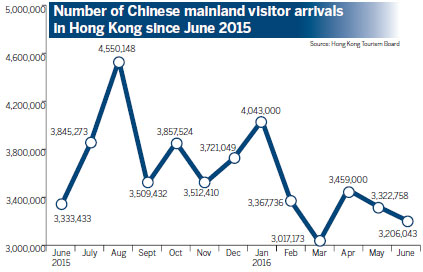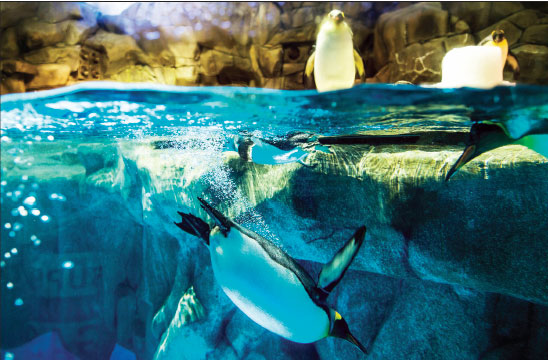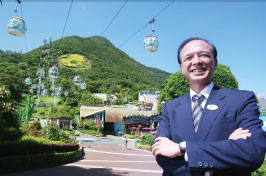Ocean Park fights on with its 'uniqueness'
Updated: 2016-08-12 07:41
By Feliks Cheang in Hong Kong(HK Edition)
|
|||||||||
HK's oldest marine-themed park confident in pushing out new attractions amid stiff competition
With strikingly family-oriented theme parks in the region, like Zhuhai's Chime Long International Ocean Resort and the newly opened Shanghai Disneyland, breathing down its neck, Hong Kong's 39-year-old Ocean Park has been hastily pulling up its socks to stay in the race.
A slew of new attractions, including water parks and plush hotels, are on the menu as the city's oldest theme park takes up the challenge and dips its toe into other Asian markets.
Chief Executive Matthias Li Sing-chung expects Ocean Park to see a turnaround in visitor traffic within years, with Chinese mainland tourists slated to make a comeback after a lengthy decline.
"It's a healthy adjustment," he says, referring to the downward swing in visitor numbers lately.
Li, who took up the top job at the popular marine-themed park just recently, blamed external factors for the subdued visitor flow, such as the negative impact of anti-mainland protests that had rocked Hong Kong earlier, and relaxed visa restrictions for mainland travelers to other tourist destinations.
|
A penguin dives into a water tank at Ocean Park. The marine-themed park saw a 14-percent dip in the number of visitors last year, compared with 2014, due to the decline in the number of Chinese mainland visitor arrivals in Hong Kong. Justin Chin / Bloomberg |
"Some mainland tourists have been discouraged by the city's unfriendliness - an attitude which may have been exaggerated. They feel they're more welcome in other (destinations)," he says.
Besides, an uncertain macro environment and a stronger US dollar have also hit tourism from the mainland. "But these are just short-term drawbacks."
Latest statistics show that total visitor arrivals in the SAR fell 7.4 percent in the first half of this year, compared wit the same period last year, with the number of mainland tourists down 3.8 percent in June, while visitor arrivals from Northeast Asia were up nearly 20 percent.
|
Matthias Li Sing-chung, chief executive of Ocean Park, believes that the rapid growth in entertainment parks on the Chinese mainland will not deal a big blow to Ocean Park's business. Instead, it would create a trend of visiting theme parks. parker zheng / China Daily |
Hong Kong's amusement parks have not been spared by the slump. As mainland visitors make up more than half of ticket sales, Ocean Park saw a 14-percent dip in the number of visitors last year, compared with 2014 - the first decline since 2008 - while Hong Kong Disneyland posted a 9-percent decline in mainland tourists.
Li says he considers the slowdown normal, especially after the upsurge in mainland tourist arrivals here in the past five years.
Hong Kong's now a "bargain destination" for mainland visitors as many local tourist spots and hotels are offering tempting discounts amid the gloom. The picture should also improve, he says, with the opening of the soon-to-be-completed Hong Kong-Zhuhai-Macao Bridge and Hong Kong's high-speed railway linking southern China.
"Convenient transportation is vital to every amusement park," Li says, adding he expects improved MTR links to encourage more local visitors from Kowloon and the New Territories to visit the parks.
Ocean Park, which opened amid great fanfare in 1977 and covering an area of more than 900,000 square meters on southern Hong Kong Island, aims to shore up local attendance which, currently, accounts for more than 30 percent of the total number of visitors. "It's a high proportion if you compare it with other theme parks," remarks Li, adding that "freshness" is the key to getting local visitors to return.

On the top of the five major annual events - the Spring Festival, Easter, the summer holidays, Halloween and Christmas - the theme park will focus on more innovative attractions and events to entertain local visitors, for whom it was built in the first place.
"Visitors want to go to places where local people enjoy as well," emphasizes Li.
Ocean Park is also looking afar - to other Asian markets to attract more visitors, including the Association of Southeast Asian Nations, which is home to more than 600 million people.
Li notes there has been an increase in the number of Indonesian and Filipino visitors to the park.
Apart from dwindling tourist numbers, Ocean Park faces stiff competition from theme parks across the border and other Asian countries. By 2018, Universal Beijing, 21st Century Fox World Malaysia, Six Flags, multiple new Legolands, Wanda theme parks and many smaller peers will be popping up across the region.
Li, who had held various positions at Ocean Park for more than two decades, aims to roll out new attractions and infrastructure, including new hotels and a perennial water park - almost 20 years after a previous one closed - and turn the park into a regional resort which will be the first of its kind in Southeast Asia that's built on a hill slope next to the sea.
He believes that the rapid growth in entertainment parks on the Chinese mainland will not deal a big blow to Ocean Park's business. Instead, it would create a trend of visiting theme parks.
"They'll come to Ocean Park as they know we are at the top of the game." Li reckons. "We're proud of being the trendsetter for amusement parks in Asia."
Apart from the attractions and rides, edutainment is what distinguishes Ocean Park from its competitors. Visitors can learn more about the animals and the threats they face through the posters at galleries and aquariums. Trainers are also available to talk about animals both in captivity and in the wild.
The Ocean Park Academy - the park's educational arm - offers more than 30 different courses for children and teachers. Students can learn about animals, conservation, the natural environment and even Chinese culture by taking part in the activities and see the real life animals and resources in the park.
"I hope visitors can have not only a lot of fun here, but also learn something about animals and conservation," says Li. "This is what makes us unique in Hong Kong, if not Asia."
feliks@chinadailyhk.com
(HK Edition 08/12/2016 page1)

